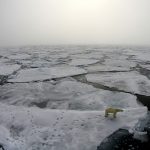 July 18, 2019 8:28 am
Published by Climate Extremes
July 18, 2019 8:28 am
Published by Climate Extremes
Gabriela Pilo and colleagues find that the Tasman Front is not so much a constant current, as is widely accepted, but switches between being an extension of the East Australian Current and an eddy field.
 July 11, 2019 11:22 am
Published by Climate Extremes
July 11, 2019 11:22 am
Published by Climate Extremes
CLEX researchers working with colleagues from the Hawkesbury Institute for the Environment revealed a method to predict the probability of tree mortality during droughts.
 July 9, 2019 9:00 am
Published by Climate Extremes
July 9, 2019 9:00 am
Published by Climate Extremes
Climate scientists testing a new mathematical and statistical method that converts projections of future climate outcomes in a warming world into reliable probabilities have found there is a significant chance the Arctic could be ice-free even if world leaders meet the Paris targets of 1.5°C and 2°C.
 July 9, 2019 1:00 am
Published by Climate Extremes
July 9, 2019 1:00 am
Published by Climate Extremes
Indian Ocean convection caused a powerful planetary wave that led to a drought in South America and a marine heatwave in the South Atlantic that lasted for months.
 July 8, 2019 2:56 pm
Published by Climate Extremes
July 8, 2019 2:56 pm
Published by Climate Extremes
The 21st Century has seen an increase in northwest cloudbands across Australia, according to a new dataset developed by CLEX researchers.
 July 3, 2019 1:17 pm
Published by Climate Extremes
July 3, 2019 1:17 pm
Published by Climate Extremes
Winter storms over the Arctic leave a legacy that breaks up the ice, melts it from beneath and has led to constant ongoing decline in old ice that far exceeds the period of the storm itself.
 June 27, 2019 11:17 am
Published by Climate Extremes
June 27, 2019 11:17 am
Published by Climate Extremes
Antarctic sea ice had been growing in area since 1979, despite the influence of global warming. Then unexpectedly in the austral spring of 2016, there was a rapid decline. CLEX researchers used multiple runs of a coupled ocean-atmosphere climate model to investigate whether these distant influences played a role and, if so, the level of the contribution to the sea-ice decline.
 June 15, 2019 7:16 am
Published by Climate Extremes
June 15, 2019 7:16 am
Published by Climate Extremes
An international team, led by Australian researchers from the ARC Centre of Excellence for Climate Extremes (CLEX) and the Institute for Marine and Antarctic (IMAS) studies, have published in Nature Communications the first global assessment of the major drivers of marine heatwaves.
 June 9, 2019 2:49 pm
Published by Climate Extremes
June 9, 2019 2:49 pm
Published by Climate Extremes
This study introduces the Monash Simple Climate Model (MSCM) experiment database. The MSCM is based on a simple climate model and provides a wide range of model simulations to illustrate how the climate system works.
 June 6, 2019 2:03 pm
Published by Climate Extremes
June 6, 2019 2:03 pm
Published by Climate Extremes
New study highlights local warming is expected to accelerate beyond the global average in mid latitude regions, especially in summer. Over oceans the rise will be below global average warming.










